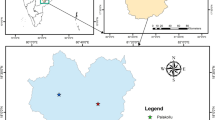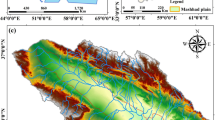Abstract
Groundwater serves as a valuable resource to supplement surface water, and its extensive utilization underscores the importance of precise groundwater level predictions. Burkina Faso confronts a critical challenge in the domain of sustainable groundwater resource management, underscoring the need for accurate forecasts of groundwater levels to enable efficient resource allocation and ensure long-term sustainability. This study introduces a robust framework that uses state-of-the-art Artificial Intelligence methodologies to predict groundwater levels across six strategically located piezometers in Burkina Faso’s Central Plateau region. The dataset combines piezometric Measurements, Rainfall, and vegetation indices that serve as a multifaceted feature space for model training. We systematically evaluated the performance of three specific machine learning models-NeuralProphet, XGBoost, and Long Short-Term Memory to determine which machine learning model offers the most robust predictions, enabling more effective and sustainable groundwater management. We observe that the XGBoost model outperforms its counterparts in terms of predictive accuracy. The findings of this study offer critical insights into the temporal variations in groundwater levels, thereby contributing to the formulation of more efficient water resource management strategies and facilitating data-driven decision-making processes in the target region.
Access this chapter
Tax calculation will be finalised at checkout
Purchases are for personal use only
Similar content being viewed by others
References
Abiye, T., Masindi, K., Mengistu, H., Demlie, M.: Understanding the groundwater-level fluctuations for better management of groundwater resource: a case in the Johannesburg region 7, 1–7. https://doi.org/10.1016/j.gsd.2018.02.004. https://www.sciencedirect.com/science/article/pii/S2352801X17301765
Belemtougri, A.P., Ducharne, A., Tazen, F., Oudin, L., Karambiri, H.: Understanding key factors controlling the duration of river flow intermittency: case of Burkina Faso in West Africa 37, 100908. https://doi.org/10.1016/j.ejrh.2021.100908. https://www.sciencedirect.com/science/article/pii/S2214581821001373
Chen, C., He, W., Zhou, H., Xue, Y., Zhu, M.: A comparative study among machine learning and numerical models for simulating groundwater dynamics in the Heihe River Basin, Northwestern China 10(1), 3904. https://doi.org/10.1038/s41598-020-60698-9. https://www.nature.com/articles/s41598-020-60698-9
Fathy, I., Ahmed, A., Abd-Elhamid, H.F.: Integrated management of surface water and groundwater to mitigate flood risks and water scarcity in arid and semi-arid regions 14(3), e1272. https://doi.org/10.1111/jfr3.12720. _eprint: https://onlinelibrary.wiley.com/doi/pdf/10.1111/jfr3.12720
Gaffoor, Z., et al.: A comparison of ensemble and deep learning algorithms to model groundwater levels in a data-scarce aquifer of Southern Africa 9(7), 12. https://doi.org/10.3390/hydrology9070125. https://www.mdpi.com/2306-5338/9/7/125
Gramont, H.M.D.: Annexe 1: Diagnostic sur les eaux souterraines 2(124661), P162723. https://documents1.worldbank.org/curated/ru/125061522099341105/pdf
He, L., Hou, M., Chen, S., Zhang, J., Chen, J., Qi, H.: Construction of a spatio-temporal coupling model for groundwater level prediction: a case study of Changwu area, Yangtze river delta region of China 21(7), 3790–380. https://doi.org/10.2166/ws.2021.140. https://iwaponline.com/ws/article/21/7/3790/82047/Construction-of-a-spatio-temporal-coupling-model
Kafando, M.B., et al.: Use of multidisciplinary approaches for groundwater recharge mechanism characterization in basement aquifers: case of Sanon experimental catchment in Burkina Faso 13(22), 3216. https://doi.org/10.3390/w13223216. https://www.mdpi.com/2073-4441/13/22/3216
Kalu, I., Ndehedehe, C.E., Okwuashi, O., Eyoh, A.E., Ferreira, V.G.: A new modelling framework to assess changes in groundwater level 43, 10118. https://doi.org/10.1016/j.ejrh.2022.101185. https://www.sciencedirect.com/science/article/pii/S2214581822001987
Khan, J., Lee, E., Balobaid, A.S., Kim, K.: A comprehensive review of conventional, machine leaning, and deep learning models for groundwater level (GWL) forecasting 13(4), 274. https://doi.org/10.3390/app13042743. https://www.mdpi.com/2076-3417/13/4/2743
Malekzadeh, M., Kardar, S., Shabanlou, S.: Simulation of groundwater level using MODFLOW, extreme learning machine and wavelet-extreme learning machine models 9, 10027. https://doi.org/10.1016/j.gsd.2019.100279. https://www.sciencedirect.com/science/article/pii/S2352801X19302127
Mbouopda, M.F., Guyet, T., Labroche, N., Henriot, A.: Experimental study of time series forecasting methods for groundwater level prediction. http://arxiv.org/abs/2209.13927
Najafabadipour, A., Kamali, G., Nezamabadi-pour, H.: Application of artificial intelligence techniques for the determination of groundwater level using spatio-temporal parameters 7(12), 10751–10764. https://doi.org/10.1021/acsomega.2c00536. https://www.ncbi.nlm.nih.gov/pmc/articles/PMC8973156/
Rahman, A.S., Hosono, T., Quilty, J.M., Das, J., Basak, A.: Multiscale groundwater level forecasting: coupling new machine learning approaches with wavelet transforms 141, 103595. https://doi.org/10.1016/j.advwatres.2020.103595. https://linkinghub.elsevier.com/retrieve/pii/S0309170819312618
Rao, P., et al.: A comparison of multiple methods for mapping groundwater levels in the mu us sandy land, China 43, 10118. https://doi.org/10.1016/j.ejrh.2022.101189. https://linkinghub.elsevier.com/retrieve/pii/S2214581822002026
Tao, H., et al.: Groundwater level prediction using machine learning models: a comprehensive review 489, 271–308. https://doi.org/10.1016/j.neucom.2022.03.014. https://www.sciencedirect.com/science/article/pii/S092523122200282X
Zarafshan, P., Javadi, S., Hashemy, S.M., Zarafshan, P., Etezadi, H.: Artificial intelligence hybrid-deep learning model for groundwater level prediction using MLP-ADAM, July 2021. https://www.researchgate.net/publication/353568143
Acknowledgements
This work was conducted as part of the Artificial Intelligence for Development in Africa (AI4D Africa) program, with the financial support of Canada’s International Development Research Centre (IDRC) and the Swedish International Development Cooperation Agency (Sida).
Author information
Authors and Affiliations
Corresponding author
Editor information
Editors and Affiliations
Rights and permissions
Copyright information
© 2024 IFIP International Federation for Information Processing
About this paper
Cite this paper
Bonkoungou, A.A., Zio, S., Sabane, A., Kafando, R., Kabore, A.K., Bissyande, T.F. (2024). A Comparison of AI Methods for Groundwater Level Prediction in Burkina Faso. In: Maglogiannis, I., Iliadis, L., Macintyre, J., Avlonitis, M., Papaleonidas, A. (eds) Artificial Intelligence Applications and Innovations. AIAI 2024. IFIP Advances in Information and Communication Technology, vol 713. Springer, Cham. https://doi.org/10.1007/978-3-031-63219-8_1
Download citation
DOI: https://doi.org/10.1007/978-3-031-63219-8_1
Published:
Publisher Name: Springer, Cham
Print ISBN: 978-3-031-63218-1
Online ISBN: 978-3-031-63219-8
eBook Packages: Computer ScienceComputer Science (R0)





